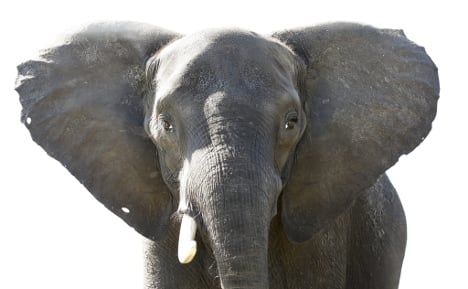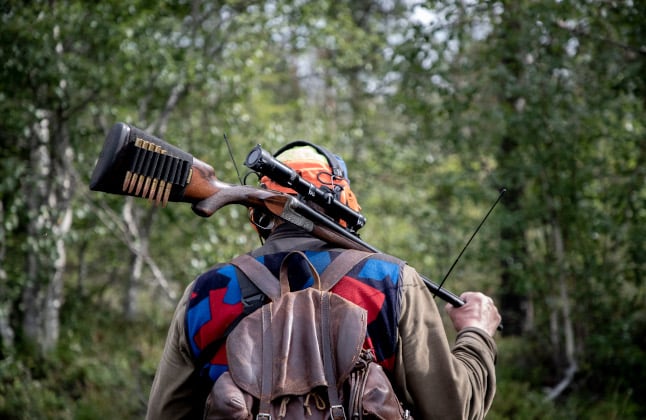The enormous elephant was shot on October 8th in Zimbabwe's Gonarezhou National Park, reports telegraph.co.uk.
A German national paid £39,000 (€53,000) for the 21-day hunt, which was led by a private hunting group and accompanied by a local professional.
It's not certain where the elephant came from – never seen before in Gonarezhou, it was speculated that the large bull may have wandered into Zimbabwe from the Kruger National Park in South Africa.
However, William Mabasa of South Africa’s National Parks was quick to quell these rumours.
“If this elephant came up from the Kruger, he would have had to go through all the communities on the edge of Gonarezhou and someone would have seen him,” he told the Telegraph.
“It’s not possible.”
Kruger’s elephant experts are looking into the case, Mabasa said.
Hunters celebrate kill
The kill was celebrated on hunting forums, where readers congratulated the unnamed German and speculated that a similar elephant might not be seen in Zimbabwe for years to come.
Screenshots: www.africahunting.com
Forum users also disputed The Telegraph's report that the elephant's tusks had a combined weight of 120lb.
“120 and 122 pounds is what they weigh,” claimed Adriaan Wepener of Pro Hunt Safaris, while Erik Grimland of Texas Hunting Done Right ventured: “That elephant has to be well over 100lb each side.”
Screenshots: www.africahunting.com
A completely legal hunt
In both Zimbabwe and South Africa, African Elephants to be hunted legally by those with appropriate permits – like the one paid for by the anonymous German hunter.
“Nothing illegal was done,” Anthony Kaschula from Private Guided Safaris told The Local.
“There should be no witch hunt for this man,” he said, “because nothing was done wrong from a legal perspective.”
There would have been benefits to keeping the elephant alive though, he said.
“Animals like this are a major tourism draw for the whole of Zimbabwe,” he explained, “and keeping them alive shows that true conservation can work in Zimbabwe.”
'Just for somebody's ego'
This type of hunting is “simply terrible, and it should be stopped as far as we're concerned,” a spokesperson for Johannesburg-based tour operator Safari With Us told The Local
“Trophy hunting isn't like normal hunting,” he said. “We're not against hunting in general but we don't support this.”
“It's cruel to animals,” he continued, adding that game isn't used for food.
“It's just for somebody's ego”
The news of the elephant's death was “horrifying,” added Jessica Lohmann, marketing and social media consultant at Safari With Us.
The elephant is just “another Cecil,” she told The Local, referring to the lion infamously shot by American dentist Walter Palmer in July.
Trophy hunting doesn't just hurt businesses who “want people to go, be informed and look at animals in their natural environments,” she said – they also hurt “whole African animal conservation programmes.”
Twitter fury
The hunter's actions been criticised by both Safari With Us and the general public on social media.
We're in mourning as the largest #AfricanElephant was recently killed: http://t.co/JhkfWVYmmE #trophyhunting #stopkillingouranimals
— Safari With Us (@safariwithus) October 16, 2015
What a terrible person Hunter shoots biggest elephant killed in Africa for 30 years http://t.co/ngD1v0QBLW
— Ellen (@EllenMignone) October 16, 2015
Can't believe someone can get pleasure out of killing something so innocent! Scumbag. #hunting #trophyhunt http://t.co/aLnMh44bX9
— Leanne Jones (@LeanneJones88) October 16, 2015
However, others took a different approach – instead aiming their dismay at the Zimbabwe government.
Hunter shoots biggest elephant killed in Africa for 30 years http://t.co/slrxjZS0sI – you have to blame the governments for allowing this
— Jim Seery (@RenewableSolar1) October 16, 2015
Good for local communities
The elephant is thought to have been between 40 and 60 years old – something the arranger of the hunt used to help justify the death.
“This elephant was probably 60 years old and had spread its seed many many times over,” he told the Telegraph.
Wishing to remain anonymous, he also stressed that as much as 70 percent of hunters' fees go back into the local communities.
“This is good for Zimbabwe and good for local people,” he said.
“It’s not uncommon for hunters to spend $100,000 (€88,000) each trip.”
By Hannah Butler



 Please whitelist us to continue reading.
Please whitelist us to continue reading.
Member comments